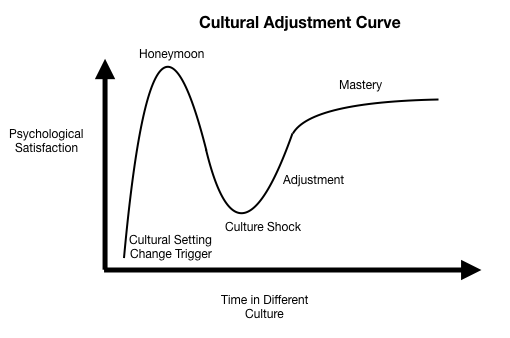Foreign assignments are usually met with the need for cultural adjustments by the respective managers. It is important to note that cultural adjustment is a continuing process that imposes new demands when a foreign manager undertakes his duties during the foreign assignment. According to research conducted by Gregory Trivonovitch, there are four distinct phases of cultural adjustment that are cyclic due to the fact an individual persistently encounters a period of adjustment when moving from one cultural context to another. The four stages identified by most models of cultural adjustment for the case of foreign managers include honeymoon, cultural shock, adjustment, and mastery phase.
The honeymoon phase of cultural adjustment is characterized by a positive perception of the cultural differences between the home and host cultural values. This is usually due to an increased fascination concerning the new cultural aspects such as new types of foods, types of buildings, individual habits, and the pace of life of the foreign country. This period is mainly characterized by intense discoveries, communication with identified nationals from their home country, and expressing politeness towards the foreigners. In this phase, foreign managers perceive the new culture as an endless opportunity whereby they approach the new culture with openness and increased curiosity and are more willing to accept the situation in a foreign country. A vital aspect in this phase of cultural adjustment is that judgment by the managers is most hesitant and irritations are concealed by an emphasis on positive aspects of the new culture. The managers in foreign assignments are friendly and maintain a superficial relationship with the nationals from the host country. Difficulties in language and cultural crisis soon begin to manifests themselves during the end of this stage.
The phase of cultural shock is characterized by apparent differences in culture between the home and foreign country, which is likely to increase anxiety for managers in foreign assignments. In this phase, foreign managers usually maintain contact with home nationals and the head office. Uncertainty is usually created due to the feeling of unease between foreign environments. Also, foreign managers usually suffer from a lack of familiar signs used for denoting orientation and individual belonging, which only serves to worsen the levels of anxiety and frustrations. Cultural identity issues are also evident during this phase of cultural shock. Communication barriers are evident due to differences in language, values, symbols, and beliefs between the home and foreign country. Foreign undertakings are at risk of failure during this phase of cultural adjustment due to differences in interpersonal and organizational behavior.
The adjustment phase is characterized by having respect for the foreign culture and establishing strategies that the manager can deploy to learn the new languages and adjust to the new social and cultural environment provided by the foreign country. It is at this point that foreign managers can either opt to return home or understand and appreciate the foreign culture or adjust to it. The adjustment phase is mainly noted by obtaining a greater knowledge of the local business scene and language.
The Mastery phase of cultural adjustment is characterized by a dual cultural identity and the manager undertaking foreign assignments feels at home in the foreign country. This usually involves recognition of the fact that foreign cultures have a lot to offer, which in turn results in a sense of bi-culturalism characterized by an acceptance of the new culture and integration of the new cultural values and norms into one habit to enforce a secure feeling in the foreign assignment. This results in an understanding of the cultural differences and increased autonomy and satisfaction, implying that the foreign manager can complete the foreign mission. It is important to note that a cultural shock is likely to face managers who are returning to their home countries after long years of foreign assignments, implying that returning managers usually undergo the above stages before coming to terms with their home culture.
